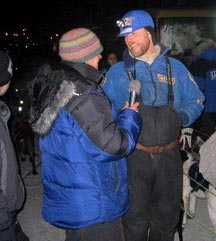
Skrevet av: Ingrid Pedersen / Ingunn Vistnes
Dato: 05.03.2004 23:51
 Petter Jahnsen (38) of Tufsingdalen won the Femundløpet Race in South-East Norway nearly one month ago. In a race where close to half of the participants quit during the race, Petter passed the finish line in Røros in style, nearly half an hour before number two Bjørnar Andersen. This makes him one of the favorites to win open class in the Finnmark Race this year. - I expect to do a good race and believe that IÂ’m one out of four or five who can win the ATV (four-wheeler) says Jahnsen modestly.
Petter Jahnsen (38) of Tufsingdalen won the Femundløpet Race in South-East Norway nearly one month ago. In a race where close to half of the participants quit during the race, Petter passed the finish line in Røros in style, nearly half an hour before number two Bjørnar Andersen. This makes him one of the favorites to win open class in the Finnmark Race this year. - I expect to do a good race and believe that IÂ’m one out of four or five who can win the ATV (four-wheeler) says Jahnsen modestly.
Unlike many of the other mushers on the 1000 km trail, Jahnsen does not have a lot of experience with the Finnmark Race. He has done the Finnmark Race once before, in 2002, ranking as number eight. He did his first long-distance race in 1995 in the Femund 300. He and his wife Bente have taken turns racing the Femund 500 since 1998.
This year he is better prepared than ever. He could start training on snow earlier than usual, and has done several long training turns on 200-400 km. To be able to spend so much time with his dogs, he works as an electrician eight months a year and as a full-time musher the rest of the year.
-It is definitely not a drawback to be a full-time musher when youÂ’re trying to win the longest sled dog race in Europe. It makes preparations easier, although others have shown that it is possible to be successful with a nearly ordinary job. ItÂ’s impossible to say who will win open class, but I believe the battle will stand between four or five mushers. The toughest rivals are probably Ralph Johanessen, Rune Johansen and Bjørnar Andersen, says Jahnsen.
Preparations ahead of this yearÂ’s race have been carried out at home in Tuftingsdalen, located 40 km south of Røros by the Femund Lake. Pete, as he is called among mushers, will be well prepared when he starts out in the Finnmark Race, with dogs who have done more kilometers than ever this season. The dogs and himself have also got an additional two years of experience since last time.
- I have been out with my sled since October 21, and have done 6,000 km so far. My team consists exclusively of adult dogs in their best age, and none of the dogs in the team have injuries or problems of any kind. Eleven of the dogs have done the 1000 km race earlier.
Pete has not only trained more this season, but has also focused on important details:
- IÂ’ve focused a lot on discipline within the team this year. This includes that the dogs should listen to me and my commands, and be aware of me. This has been successful thanks to positive reinforcement; the same principles used in professional dog training, says Pete, who has his background in obedience training of dogs.
The Femund race 2004 was characterized by hard surfaces and high speed; conditions where Pete and his team were unbeatable. Only Bjørnar Andersen could keep up with his speed, but even Andersen and Backen lost speed during the last 10-20 km before the finish line. We take it, then, that Pete hopes for hard snow cover and high speed across the Finnmark mountain plateau?
- IÂ’ve trained during varying trail and weather conditions, so my dogs will race both in fast trails and in deep snow. I hope for good weather because it makes the journey much more pleasant. Even if I start out to win, the wilderness experience will always be an important part of the Finnmark Race, says Pete, originally from Oslo.
What makes you use so much time, resources and money on long-distance racing?
- The outdoor experience is important to me. I simply love being outdoors. Also, dog mushing is one of the most complicated things you can do, which makes it the greatest challenge I can think of.
- Imagine trying to get a team of 16 personalities to cooperate with each other and with yourself. You have to get to know every one of the dogs and to treat them individually to make them work at the optimal level. At the same time, the team has to function as one unit and be willing to give everything for you when needed in a race. I believe that dog mushing can be developed indefinitely, but it demands a lot of work - and the right work - over a long period of time. Hence, you will always have new goals to strive for as a musher. This is what fascinates me the most, says Pete Jahnsen.